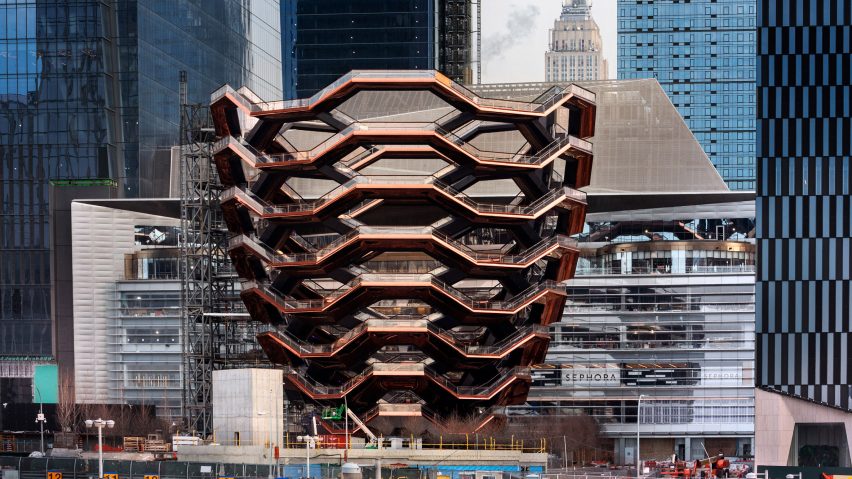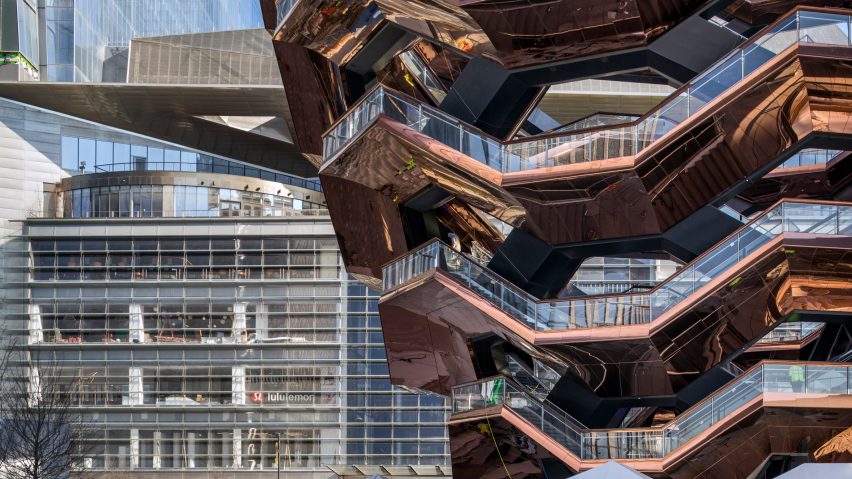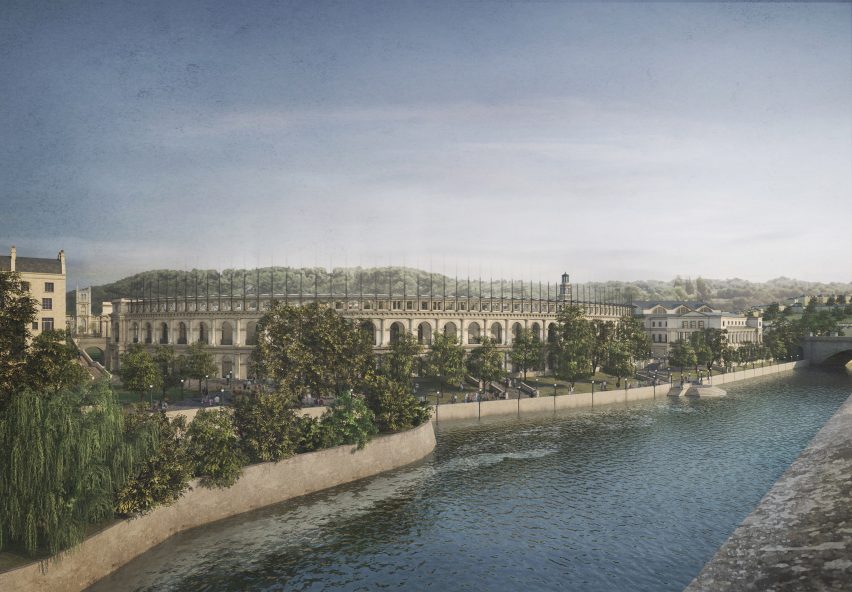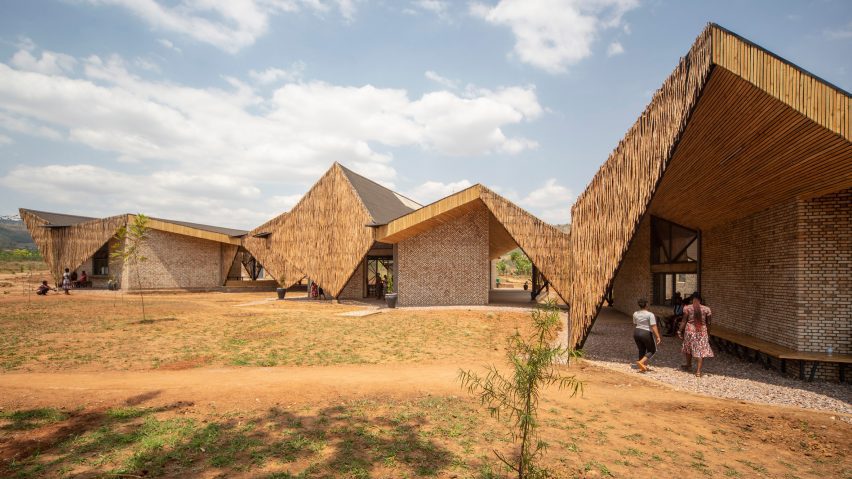
It is architect's role "to point out health and safety risks" says commenter
In this week's comments update, readers are discussing an opinion piece by Matt Shaw that reflects on what went wrong with Thomas Heatherwick's Vessel, two years after it was closed following a series of suicides.
The Vessel, a 150-foot-high viewing platform in New York's Hudson Yards development, has been closed since July 2021.
Four people died by suicide in four different incidents at the platform; the fourth death coming just months after the structure reopened following temporary closure and the implementation of suicide prevention measures.
"The Vessel's demise can be traced back to its lack of public process," writes Shaw. "Built on private property, it never was subjected to, or benefitted from, any kind of design review process. A single client and single designer. This huge, embarrassing failure could have easily been prevented with even an ounce of community feedback."

"You should not expect public consultation to point out the health and safety risks"
Commenters largely agreed with Shaw's assessment that "the Vessel gives nothing back to the city".
"The Vessel is emblematic of what feels wrong about the entire Hudson Yards area," wrote Eric Schneider. "I can’t call it a neighbourhood because it lacks, entirely, any sense of place and just seems like an upscale open-air shopping mall where the rich can sit in traffic in their SUVs."
Elizabeth_NYC was on the same page, commenting "almost everything in Hudson Yards makes me despair. Compare it to the King's Cross development in London where they actually tried".
"Of course, it is also marred – and yes, I believe that to be the accurate word – by a Heatherwick intervention. But for the most part, it has urban goodies and people want to be there, not only to shop and eat," they continued.
But commenters were at odds over where the responsibility for health and safety lies.
"Why is it the architect's problem when people [commit] suicide?" wrote Vincent Ip.
"It is a crazy world that everyone condemns builders for buildings that can't prevent suicides," added Timothy Wang. "But we don't condemn weapons manufacturers for making guns that are designed to kill. Not sure if it is the responsibility of builders to prevent suicides."
Commenter Natalie added:
"I worry that articles [such as Shaw's] absolve architects from their moral responsibility to provide a building – or whatever the Vessel is – that is safe for the end-user," they wrote.
"While community consultation is a crucial part of the architectural process, you don't need, and should not expect, public consultation to point out the health and safety risks. This is the architect's role."
Despite its unfortunate history, some commenters were optimistic about the Vessel's future.
"While the tragic outcome of the Vessel may make it not 'functional', I'm sure some would argue that many other large-scale public artworks (some approaching this price tag to build) are also not 'functional'," wrote Vandra. "I'm still hopeful a solution can be found and the stairs can reopen."
What do you make of the Vessel two years after its closure? Join the discussion ›

"Like a stadium with a suit on – classy"
Also rife for debate in the comments section this week was a Colosseum-like stadium in Bath, UK, which British studio Apollodorus Architecture designed in response to a proposed redevelopment put forward by Bath Rugby.
The London studio's alternative scheme would feature an oval shape that references Roman amphitheatres – a style it believes would merge more organically with the context of the surrounding city than the proposed rectangular building.
Some commenters deemed the alternative design "absolutely charming", while others thought it was too "pastiche".
"The elliptical plan and a meaningful connection to the street to the east make a lot of sense," wrote Dwf. "As for the classical expression, it's quite difficult to argue against. Bath is mostly neo-neo-classical or Georgian revival and has always been a sort of theme park."
"Looks gorgeous! Best development proposal in the UK since Poundbury," declared TheManHimself. "So much better than much of the cold and hostile modern architecture being churned out since the 1950s."
Schrondingers Cat was also all in favour, saying: "it's like a stadium with a suit on. Classy. Leave it to the Decon cult to argue for an angular shardscape with shiny goo and large projectors."
But Ryan Peter Nolan disagreed, stating: "It's a copy-and-paste of every classical stadium and it's boring! It's giving Poundbury (which is tacky). Why not produce a more thought-provoking and modern interpretation? Do some actual work and give value to it."
Most commenters, though, agreed that "context is key".
"Very appropriate for the context. Most importantly it doesn't scream 'look at me!', which should be the rule for 99.9 per cent of all buildings," posited Apulia.
Copy-and-paste or charming reinterpretation? Join the discussion ›

"Sublime!"
One thing that commenters could agree on this week was the "beautiful execution" of an angular leadership centre in Rwanda by BE_Design.
Informed by the geometric patterns of Rwandan Imigongo art, the Komera Leadership Centre is comprised of a cluster of blocks each topped by an angular, zig-zagging roof.
The centre, which BE_Design's local office worked on with Rwanda Village Enterprises, provides spaces for health, education, and mentorship programs for young women, as well as community areas.
"Amazing project. Beautifully executed and the planning is really well-considered," wrote Mr Marsden.
Milos Mon called it "a lovely creation," while Rachael Evans simply wrote "sublime!"
"Absolutely LOVE this! Well done BE_Design," concluded Nicole Blair.
Are you similarly captivated by the Komera Leadership Centre? Join the discussion ›
Comments update
Dezeen is the world's most commented architecture and design magazine, receiving thousands of comments each month from readers. Keep up to date on the latest discussions on our comments page and subscribe to our weekly Debate newsletter, where we feature the best reader comments from stories in the last seven days.